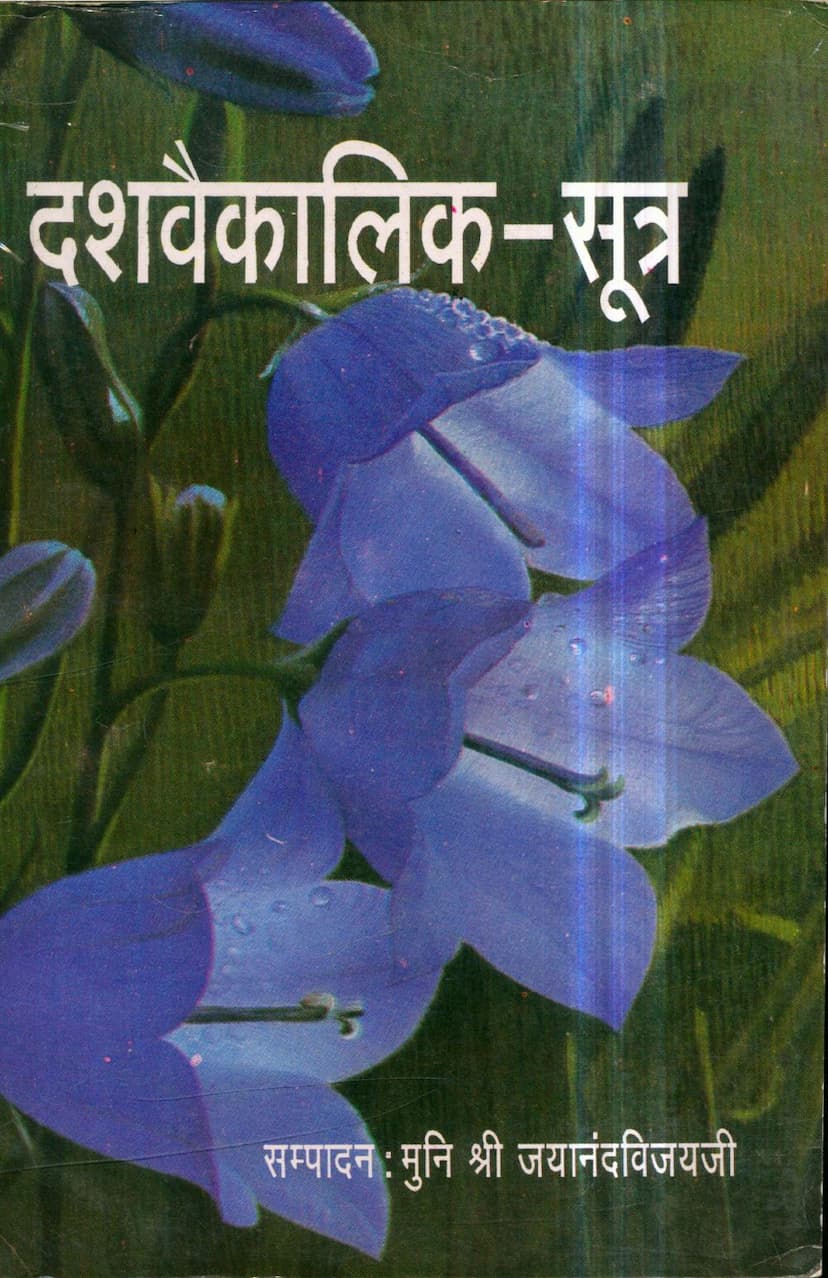Dashvaikalaik Sutra
Added to library: September 1, 2025

Summary
Here's a comprehensive summary of the Dashavaikalika Sutra based on the provided text:
Title: Dashvaikalika Sutra Editor: Muni Shri Jayanandvijayji Publisher: Shri Guru Ramchandra Prakashan Samiti, Bhinmal (Jalore, Rajasthan) Catalog Link: https://jainqq.org/explore/022576/1
Overview:
The Dashavaikalika Sutra is considered one of the essential Agamas (canonical texts) in Jainism, recognized by the Jains among the 45 accepted Agamas. It is part of the 11 Angas and is attributed to Shrimad Shyyambhavswamiji Maharaj, the fourth spiritual successor in the lineage after Bhagavan Mahavir Swami. He was a disciple of the great Acharya Shrimad Shyyambhavswamiji Maharaj, who compiled this sutra for his young disciple Manak.
The sutra is highly regarded for its practical guidance on the conduct and practices of Jain ascetics (monks and nuns), particularly focusing on their daily lives and ethical responsibilities.
Content and Structure:
The Dashavaikalika Sutra is divided into ten chapters (Adhyayanas), each addressing specific aspects of ascetic conduct and philosophy. The text also includes two Chulikás (appendices) which are said to have been received from Bhagavan Shrimandhar Swami.
Summary of the Ten Chapters:
- Drum Pushpika (Tree Flower Garland): This chapter praises religion and describes the nature of the mendicant's life (Madgkari Vritti). It emphasizes the importance of detachment and living solely on alms.
- Shramanyapoorvika (Ascetic Origin): This chapter advises against restlessness in asceticism and using the example of Renémi to renounce enjoyed objects. It focuses on the importance of mental fortitude and resisting temptations.
- Shrullakaachara Katha (Minor Ascetic's Tale): This chapter describes the five great vows (Panch Mahavratas) and the protection of the six types of living beings (Shad Jivanikaya). It also discusses the increasing fruits of practicing compassion and non-violence.
- Shad Jivanikaya (Six Life Forms): This chapter details the practices of alms-seeking (Gochari), the distinction between permissible and impermissible food, and the prohibition of taking impure or tainted food.
- Pindeshana (Alms- Seeking): This chapter elaborates on the proper method of seeking alms, the distinction between permissible and impermissible food, and the prohibition of taking impure or tainted food.
- Sadhu Achar Praroopana (Description of Monastic Conduct): This chapter explains monastic conduct when questioned by kings, ministers, priests, warriors, merchants, and other prominent individuals. It discusses the corruption of monasticism through the indulgence in eighteen specific activities and the rewards of adhering to monastic discipline.
- Savadh-Niravadh Bhasha (Sinful vs. Sinless Speech): This chapter describes the nature of sinful and sinless speech, advising the abandonment of sinful speech and emphasizing the results of practicing sinless speech and maintaining purity of speech.
- Sadhu Achar Vichar (Monastic Thoughts and Actions): This chapter outlines the conduct of monks, the protection of the six life-forms as a means to Dharma, methods to conquer passions, and the importance of not offending the Guru. It also reiterates the fruits of sinless speech and adherence to monastic conduct.
- Ashikshanacharya Pranihti (Instruction for Less Learned Acharyas): This chapter emphasizes respecting even less learned or less qualified gurus and outlines the nature of contentment in learning and spiritual realization.
- Tatharoop Sadhu (The True Ascetic): This chapter describes the characteristics of a truly accomplished mendicant and the fruits of a mendicant's life.
Two Chulikás:
- First Chulika: This part describes the intricacies of the world from eighteen different perspectives to help the soul remain steadfast in self-control and highlights the superiority of the monastic path.
- Second Chulika: This part elaborates on the nature of living detachedly, the virtues of irregular dwelling, and the teachings of ascetics regarding their conduct, travels, and time management.
Significance and Practice:
The Dashavaikalika Sutra is considered fundamental for Jain monks and nuns, as it is considered essential for their spiritual training and eligibility for higher initiations ("Badi Diksha"). Its study is mandatory for aspiring ascetics.
Commentaries and Translations:
The text has been extensively commented upon by renowned scholars, including Shrimad Haribhadrasuriji Maharaj (with his extensive commentary "Shişyabodhini" and Avachuri) and Shrimad Samay Sundarji (with his commentary "Dipika"). While ancient Sanskrit commentaries exist, the current publication by Guru Ramchandra Prakashan Samiti aims to provide an accessible and clear Hindi translation and explanation for the general public, making the profound teachings of this sacred text available to a wider audience.
Overall Message:
The Dashavaikalika Sutra serves as a practical guide for ascetics, emphasizing principles of non-violence (Ahimsa), self-control (Samyama), detachment, purity of conduct, and the importance of right faith and knowledge. It provides a detailed framework for living an ethically pure and spiritually disciplined life.